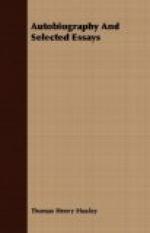And how has it fared with “Physick” and Anatomy? Have the anatomist, the physiologist, or the physician, whose business it has been to devote themselves assiduously to that eminently practical and direct end, the alleviation of the sufferings of mankind,—have they been able to confine their vision more absolutely to the strictly useful? I fear they are the worst offenders of all. For if the astronomer has set before us the infinite magnitude of space, and the practical eternity of the duration of the universe; if the physical and chemical philosophers have demonstrated the infinite minuteness of its constituent parts, and the practical eternity of matter and of force; and if both have alike proclaimed the universality of a definite and predicable order and succession of events, the workers in biology have not only accepted all these, but have added more startling theses of their own. For, as the astronomers discover in the earth no centre of the universe, but an eccentric [48] speck, so the naturalists find man to be no centre of the living world, but one amidst endless modifications of life; and as the astronomers observe the mark of practically endless time set upon the arrangements of the solar system so the student of life finds the records of ancient forms of existence peopling the world for ages, which, in relation to human experience, are infinite.
Furthermore, the physiologist finds life to be as dependent for its manifestation of particular molecular arrangements as any physical or chemical phenomenon; and wherever he extends his researches, fixed order and unchanging causation reveal themselves, as plainly as in the rest of Nature.
Nor can I find that any other fate has awaited the germ of Religion. Arising, like all other kinds of knowledge, out of the action and interaction of man’s mind, with that which is not man’s mind, it has taken the intellectual coverings of Fetishism or Polytheism; of Theism or Atheism; of Superstition or Rationalism. With these, and their relative merits and demerits, I have nothing to do; but this it is needful for my purpose to say, that if the religion of the present differs from that of the past, it is because the theology of the present has become more scientific than that of the past; because it has not only renounced idols of wood and idols of stone, but begins to see the necessity of breaking in pieces the idols built up of books and traditions and fine-spun ecclesiastical cobwebs: and of cherishing the noblest and most human of man’s emotions, by worship “for the most part of the silent sort” at the Altar of the Unknown.




